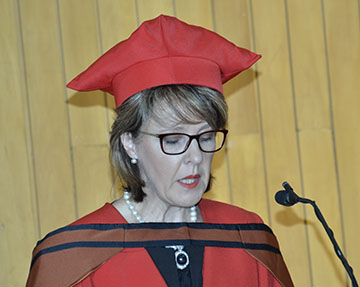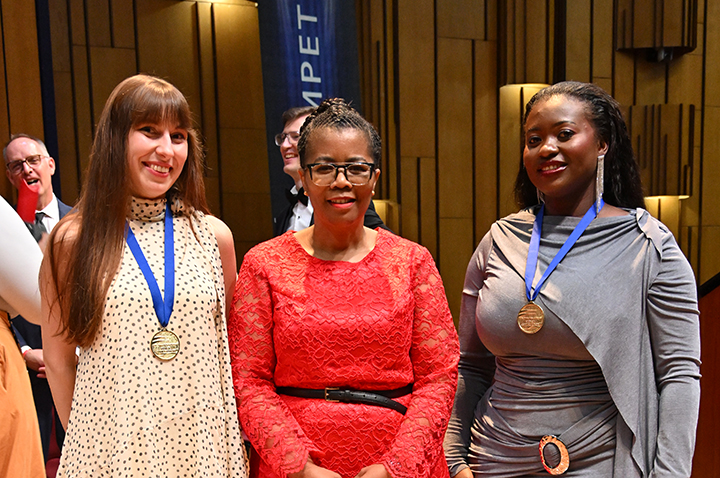
Equipped with state-of-the-art laboratories that provide students with hands-on experiences to bridge theory and practice
Professor Elizabeth Kempen, of the Department of Life and Consumer Sciences in the College of Agriculture and Environmental Sciences, delivered her inaugural lecture virtually on 21 April 2021.

Professor Elizabeth Kempen
The aim of Kempen’s lecture was to present the importance of consumer science as a discipline and profession established to improve the immediate environment and contexts in which consumers in South Africa live, work and function. As she explained, this is achieved through teaching students and educating consumers within the framework of the specialist fields of food and nutrition, clothing and textiles, production and construction skills in these fields, and research related to these areas of specialisation.
Consumer decisions key
In all of these, consumers make decisions that affect the micro-, meso- and macro-analytical environments within which they survive and function. This observation brought Kempen to the focus of the lecture, namely the contribution of research on consumer decisions within the discipline of consumer science as a means to achieve a better understanding of the complexity of the behavioural differences among consumers and the implications of this for teaching students.
Her lecture touched on the past, present and future of the development of consumer decision-making, an important area within the field of consumer science.
South Africa is one of very few countries that offer tertiary qualifications in consumer science that have direct links to consumer studies offered at secondary level. Kempen pointed out that the value of consumer science is not always acknowledged, and that it is not always clear to academic institutions precisely what a consumer scientist does and why it is important to continue supporting this qualification both at university and as a subject at secondary level. The need for continuous justification of this discipline is not only a feature in South Africa, but is also a global tendency.
The South African difference
Unlike in other countries, a consumer scientist in South Africa has specialised knowledge of those aspects of human life that relate to food and nutrition, clothing and textiles, and shelter (including housing/interior and hospitality related aspects) imbedded in the business or, in some instances, entrepreneurial context.
This area of specialisation diffuses into opportunities to educate, engage in research and development for food retailers or manufacturers, and manage operations in the food and beverage industry. It also offers opportunities to create entrepreneurial opportunities leading to job creation and improved quality of life through small business ventures in the areas of food, clothing, soft furnishings or any other creative craft, manage apparel retail and fashion production operations, as well as engage with communities to improve food security and assist in poverty relief and skills transfer.
Kempen expressed the view that the opportunities for a consumer scientist are endless, but because the focus falls on topics that have become synonymous with our daily existence, their importance may be underplayed and taken for granted. However, it is precisely these topics that become the subject of daily decisions for consumers, influencing their quality of life, as many of these decisions hinge on the availability of resources, contexts and circumstances.
At universities consumer science is offered, despite variations in focus, students are taught the science of food, which is essential in servicing the food and beverage industry, whether it be in the manufacturing or the development context. Included in their learning is the importance of nutrition, which is inseparable from any food content offerings.
Applying this combination of knowledge, some consumer scientists find employment in food companies where they may be required to use raw materials to modify food products. They may also be required to develop unfamiliar indigenous grains into food products that the consumer will find palatable, or to work in communities to help ensure food security through vegetable gardens or to instil food literacy, to name just a few contexts.
The creative angle
Another important area in which consumer scientists are active is the science of clothing and textiles, which can be either a separate specialisation or combined with food and nutrition. Creative students and learners enrolled for clothing and textile programmes have the opportunity to engage with the science of textiles (natural and synthetic), new developments in textiles and clothing manufacturing (including 3D body scanning or the use of smart mirrors in retail stores) and the finer art of construction and product development (mass or custom made), making them employable in the manufacturing, retail and entrepreneurial fields.
Kempen emphasised the importance of entrepreneurship, which features specifically in the Fashion Small Business stream offered by Unisa within the Consumer Science qualification and a theme included in the Consumer Studies curriculum offered to learners in Grades 10 to 12. In many instances apparel, soft furnishing or craft-related small businesses offer work opportunities to communities, contributing to social capital, so desperately needed in South Africa at present.
In her conclusion, Prof Kempen reiterated that the contribution of consumer scientists to social capital spans many areas, and does so by equipping the consumers of tomorrow with knowledge and skills. Through a better understanding of the way consumers in both the local and broader South African context make decisions, the knowledge gap can be reduced to bring about behaviour change. Consumer scientists are able to equip students and learners with knowledge and skills either to help themselves or to become part of a team working to fulfil the basic psychological needs, such as food, shelter and clothing, of consumers in South Africa. The service rendered by consumer scientists to the community of consumers, from all walks of life, fits with the vision of Unisa: “Towards the African university shaping futures in the service of humanity” in that individuals, families and communities are shaped to become better consumers.
Response by Dr Tracy Masebe
Dr Tracy Masebe, Chair of Department of the Department of Life and Consumer Sciences, extended her congratulations to Kempen on the occasion of her inaugural lecture.
She traced the evolution of the consumer studies field, its influence on our daily lives, and the perceptions of consumer scientists and of the discipline.
In her message of thanks to Kempen, Masebe made the observation that the promotion of local products will reduce exports and boost the South African economy, ultimately leading to job creation for many South Africans, thus addressing some of the 2030 national developmental goals.
* Submitted by Gugulethu Ncgobo, Communications Specialist, College of Agriculture and Environmental Sciences
Publish date: 2021/05/26
 Unisa celebrates a project of hope, dignity and student success
Unisa celebrates a project of hope, dignity and student success
 Women vocalists take top honours at Unisa's globally renowned showcase
Women vocalists take top honours at Unisa's globally renowned showcase
 African wealth is dependent on investment in education and development
African wealth is dependent on investment in education and development
 Unisa celebrates matric result success at Correctional Services ceremony
Unisa celebrates matric result success at Correctional Services ceremony
 Unisa ICT Director recognised among acclaimed IT leaders
Unisa ICT Director recognised among acclaimed IT leaders